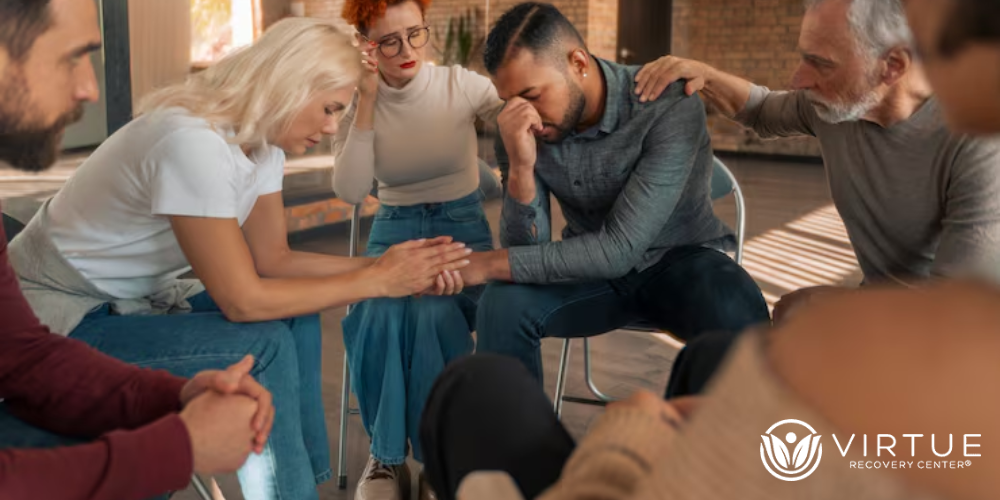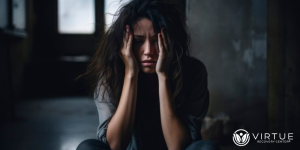Key Takeaways
- LGBTQ+ people are more likely to get addicted because of stress from their identities, prejudice, and mental health problems that happen at the same time.
- Substance Abuse Disorder Treatment must involve inclusive care, affirming, and taking trauma into account.
- Motivational interviewing and personalized depression treatment programs are two examples of techniques that establish trust and help people get better.
- More and more, cocaine and alcohol rehab programs in Las Vegas are realizing how important it is to provide culturally sensitive care.
- It is essential to reduce stigma in addiction treatment so that LGBTQIA+ clients feel safe seeking and staying in recovery.
Introduction
Addiction isn’t just about needing drugs; it’s also about emotional distress, identity, and the social situation. For LGBTQ+ people, addiction typically starts as a way to get away from stigma, prejudice, and suffering that is based on their identity. Traditional recovery programs may not work at all for this vulnerable group if they don’t offer affirming and inclusive care.
That’s why substance abuse disorder treatment that takes culture into account isn’t just a choice; it’s necessary. Recovery programs that understand how being marginalized and having mental health problems might affect LGBTQ+ clients can help them. These programs give people the respect and protection they need to heal in a real way, while also addressing depression and trauma and providing treatment places that are open to everyone.
Why Do LGBTQ+ People Have a Higher Chance of Having Substance Use Disorders?
The Substance Abuse and Mental Health Services Administration (SAMHSA) says that LGBTQ+ persons are more than twice as likely to use illegal drugs and almost twice as likely to have substance use disorders as their straight counterparts.
According to the Centers for Disease Control and Prevention (CDC), as well, LGBTQ+ youth are significantly more likely to experience substance use, suicidal thoughts, and mental health challenges than their heterosexual peers, mainly due to societal and family rejection (CDC – Health Disparities Among LGBTQ Youth). These methods of staying alive can become harmful habits over time.
What Part Does Stigma Play in LGBTQIA+ Addiction?
There is a double burden because of the stigma around addiction and being LGBT. LGBTQ+ people may not seek help because they are afraid of being discriminated against, misgendered, or judged in places that aren’t friendly. Even when people ask for help, general programs often don’t know how to deal with queer-specific problems like coming out, being estranged from family, or gender dysphoria.
The first step toward real change is to show how stigma affects LGBTQIA+ addiction. People who help people with addiction must understand that rehabilitation is more than simply getting sober; it’s also about getting back to who you are and feeling comfortable emotionally. The best care is provided by programs that actively integrate queer voices, hire LGBTQ+ doctors, and ensure everyone feels welcome.
How Does Motivational Interviewing Help People Trust Their Treatment?
Motivational interviewing (MI) is a type of counseling that focuses on the client, helping them explore their feelings about making changes. This method can be beneficial for LGBTQ+ clients, as it respects their independence and personal beliefs, which are often overlooked in the lives of people who are already marginalized.
MI helps people in therapy feel less defensive and scared by changing the focus from shame to self-efficacy. Clients are not told what to do; instead, they are encouraged to say why they want to change and see a future without drugs. This is why MI is so helpful in the early stages of recovery, particularly when integrated into substance abuse disorder treatment programs that serve diverse populations, like Las Vegas alcohol rehab centers.
What Kinds of Treatment Are Available for LGBTQ+ People Who Have Both Depression and Another Mental Illness?
LGBTQ+ people typically use drugs and alcohol along with mental health problems such as sadness, anxiety, and trauma. A substance abuse disorder treatment that also addresses depression includes addiction care, making sure that the emotional anguish that is causing the sadness is dealt with, not just covered over by sobriety.
These programs utilize therapies that have been proven effective, including Cognitive Behavioral Therapy (CBT), medication management, and trauma-informed approaches that take into account the client’s unique identity and life experiences. For instance, trans kids who are thinking about killing themselves or LGBT adults who are dealing with rejection trauma need specific tactics that go beyond general mental health therapy.
Are There Rehab Centers Just for LGBTQ+ People Who Are Addicted to Cocaine?

Yes. More and more cocaine addiction rehab centers are using inclusive models that take into account the unique social and psychological issues that LGBTQ+ clients face. Cocaine use is widespread in party scenes that have long been connected to LGBTQ+ areas. This makes recovery a medical and cultural process.
These treatment programs include detox, behavioral therapy, support groups, and occasionally harm-reduction models that are created for LGBTQ+ lives. Staff members who represent the community and peer-led groups also make people feel safer and more connected.
Do Las Vegas Rehab Centers Offer Care That Is Good for LGBTQ+ People?
Of course. More and more alcohol rehab centers in Las Vegas are now offering programs that are expressly designed to include LGBTQ+ people. Staff training on the use of pronouns, trauma-informed treatment, and cultural competence is a top priority at these facilities.
Programs that provide housing accommodations based on gender identity, peer-led LGBTQ+ groups, and connection to inclusive community support significantly increase recovery success. As the CDC – Supporting LGBTQ+ Youth guide outlines, affirming environments—whether in schools, clinics, or treatment centers—can dramatically reduce the risks of depression, substance abuse, and suicide in the LGBTQ+ population.
Conclusion
People who are LGBTQ+ need more than just conventional addiction treatment. They need programs that know who they are and what they’ve gone through. Affirming, inclusive, and comprehensive substance abuse disorder treatment is not just compassionate—it’s essential for sustainable recovery.
You don’t have to go through depression, an identity crisis, or an addiction to alcohol or cocaine by yourself. Call Virtue Recovery Center in Killeen at 866-843-0545 right now. Our LGBTQ+-friendly programs provide care based on facts and offer a place where you won’t be judged, making healing finally feel attainable.
Frequently Asked Questions
1. How is LGBTQ+ substance abuse therapy different from regular rehab?
These programs provide care that is sensitive to other cultures and takes into account pressures that are unique to each person, such as trauma connected to identity, discrimination, and mental health concerns that happen at the same time.
2. Does the Virtue Recovery Center offer programs specifically for LGBTQ+ individuals?
Yes. Virtue Recovery Center offers treatment programs that are open to everyone and support LGBTQ+ people with their unique needs and problems.
3. Is it possible for me to get therapy for both my mental health and my addiction at the same time?
Yes. For greater results, integrated treatment programs treat depression, trauma, and addiction all at once.
4. What kinds of therapy work for LGBTQ+ clients?
Motivational interviewing, cognitive behavioral therapy (CBT), trauma-informed care, and group support are all very helpful for LGBTQ+ people who are trying to get better.
Resource Links:
- Substance Abuse and Mental Health Services Administration. 2019 NSDUH Annual National Report. U.S. Department of Health and Human Services, 2020.
https://www.samhsa.gov/data/report/2019-nsduh-annual-national-report - Centers for Disease Control and Prevention. Substance Use Among Youth. U.S. Department of Health and Human Services, 2024.
https://www.cdc.gov/youth-behavior/risk-behaviors/substance-use-among-youth.html - Centers for Disease Control and Prevention. “Health Disparities Among LGBTQ Youth.” Adolescent and School Health, CDC, 29 Nov. 2024.
https://www.cdc.gov/healthy-youth/lgbtq-youth/health-disparities-among-lgbtq-youth.html cdc.gov+1cdc.gov+1 - Centers for Disease Control and Prevention. “Supporting LGBTQ+ Youth.” Adolescent and School Health, CDC, 7 months ago.
https://www.cdc.gov/healthy-youth/lgbtq-youth/index.html
- About the Author
- Latest Posts
Gigi Price holds licenses as a Master Social Worker and Clinical Drug Counselor. She completed her master’s degree in Social Work at Texas State University. Over the last decade, Gigi has been dedicated to utilizing evidence-based practices to enhance patient care and treatment planning, resulting in positive, long-term outcomes for patients and their families. Her passion lies in creating a treatment environment where professionals collaborate to bring about positive change and provide a safe, trustworthy therapeutic experience. Patients can be confident in receiving top-quality care under her leadership.
In her role as the Clinical Director of Virtue Recovery Houston, Gigi conducted research to identify the most effective approaches for treating patients with acute mental health diagnoses, PTSD, and Substance Use Disorder. She then assembled a team of skilled clinicians who could offer various therapeutic modalities, such as Cognitive Behavioral Therapy (CBT), Dialectical Behavioral Therapy
(DBT), Acceptance and Commitment Therapy (ACT), Somatic Exposure, Eye Movement Desensitization and Reprocessing (EMDR), and Cognitive Processing Therapy (CPT). Gigi takes pride in overseeing the development and implementation of Virtue Houston’s Treatment Program, which includes two specialized therapeutic curricula tailored to the unique needs of individuals struggling with mental health issues, addiction, and PTSD.












